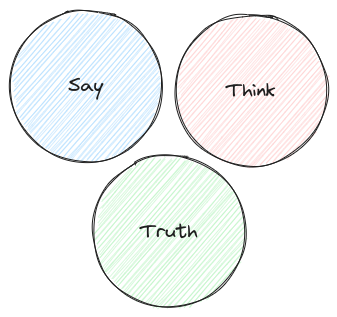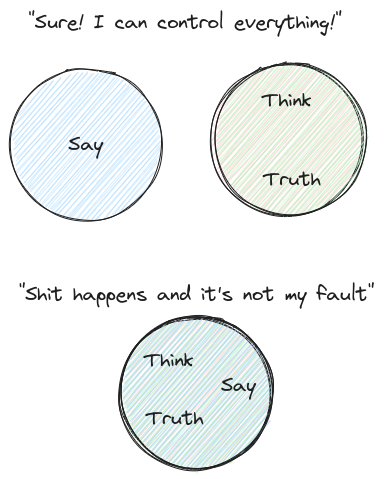It's OK not to say what you think
It’s common advice that you should only say what you believe is true, but actually, like most topics, there’s no silver bullet. Living by this rule is extremely inefficient and can lead you to places where you’d rather not be. So, most people following through with this advice will choose to omit or express a watered-down version of what they are really thinking, and that’s a shame.
I tried to live like that for a while and noticed I was talking much less than usual and not expressing myself in the world as I’d like to. That is because I was afraid of hurting others or being ostracized for having an opposing opinion. After that, I let myself be a bit loose on my resolutions and see what happened. I started making concessions and being flexible in what I said, maybe telling different things to different people when talking about the same subject. But still, maybe neither was quite aligned with what I thought. And it started working. Conscious misalignment of what I thought with what I said meant that I could tweak my view a little and adjust it for what the listener would better understand. Of course, given a careful enough listener and a meta conversation, the misalignment itself could be discussed, and I could bring myself closer to saying what I think.
For some terminology, what I mean by “contradicting yourself” and misaligning is that maybe you have an opinion about something, but that opinion may not help you right now. So it’s okay to express yourself as having a different view for the time being. This means that you can, for example, believe the outcome of your life isn’t based only on your actions and depends on a multitude of variables that you can’t control. But acting that way may not be very useful, as you can get trapped into thinking, “Oh well, some things are just out of my control 🤷,” and expressing as if you are solely responsible for the outcome can be a much better move.
All of this is based on a framework for problems where being right isn’t the priority, but solving the problem, and it proposes viewing topics through three variables: what you think, what you say, and what it is (the truth). My thesis is that you should try to keep two aligned.

On the life outcome example, it should look something like this:
